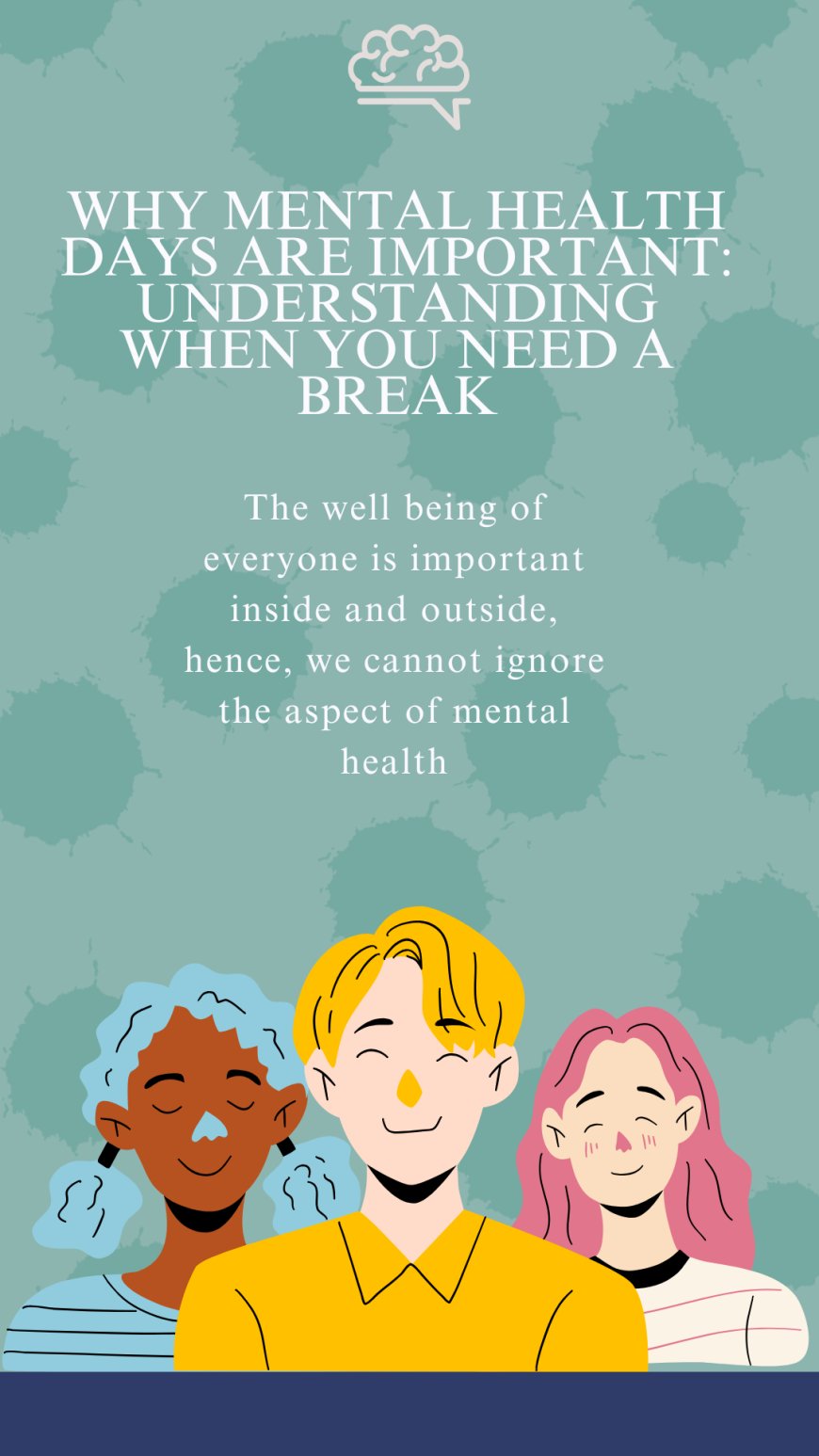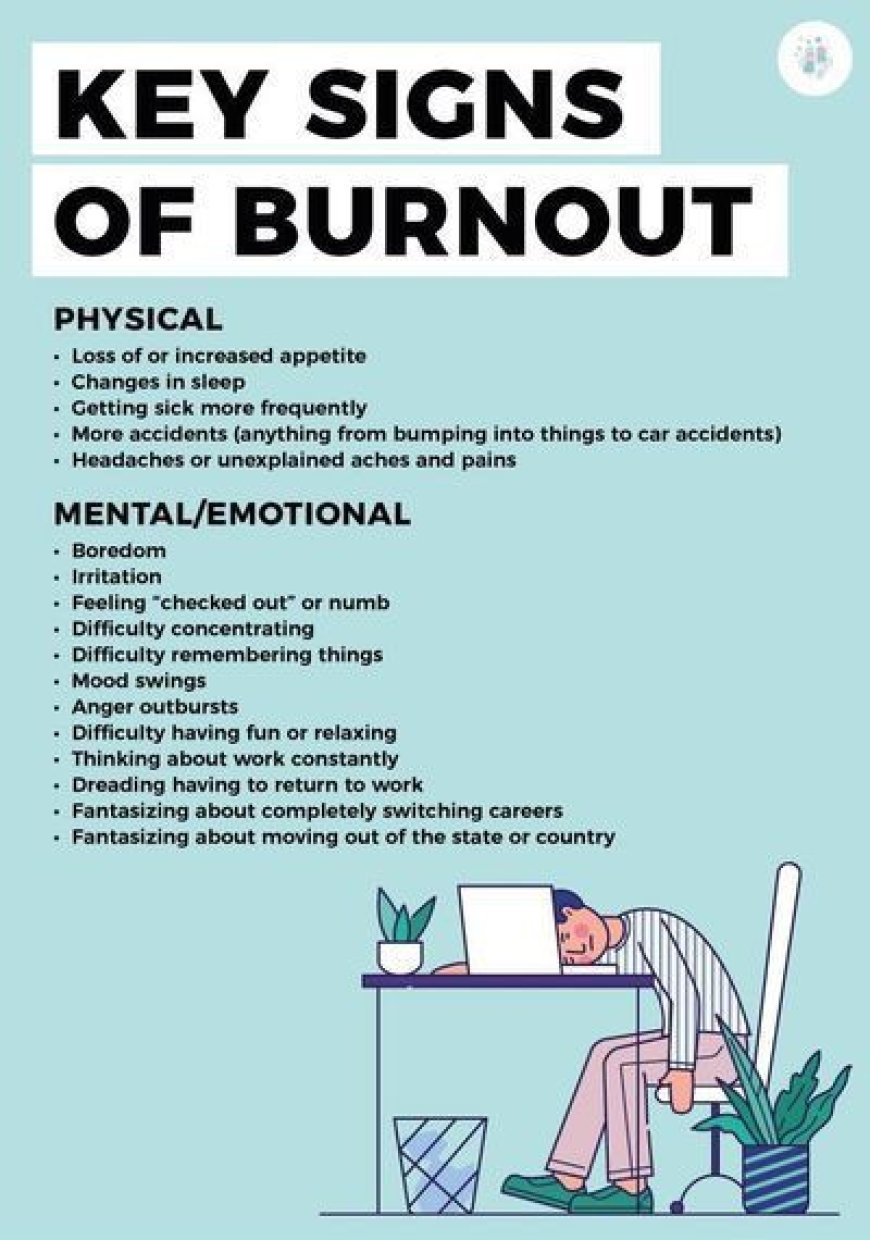Why Mental Health Days Are Important: Understanding When You Need a Break
Discover why taking mental health days is essential in today’s high-stress world. This article explores the benefits of these rejuvenating breaks, how to recognize signs that you need time off, and strategies to overcome the stigma around mental health self-care. Learn practical tips to make the most of your day, whether you’re working remotely or in the office, and understand the vital role employers play in supporting mental well-being. Prioritizing mental health isn’t just about avoiding burnout—it’s key to sustaining productivity, creativity, and a balanced, fulfilling life.

Mental health often takes a back seat, often sacrificed in the name of achievement, in today's productivity-driven society. Between the pressure of a job, personal life, and social expectations to perform at all times, we put ourselves through never-ending cycles of stress, anxiety, and exhaustion, which eventually lead to a breakdown.
In this article, the benefits of mental health days, when you should take a break, and how to overcome the stigma associated with mental health self-care will be carefully explained.
WHAT ARE MENTAL HEALTH DAYS AND WHY DO THEY MATTER?
Mental health days are days off from work that are intended to rejuvenate your mental and emotional well-being. They are intended to combat stress, worry, and mental tiredness. Mental Exhaustion has become a global concern, costing economies billions of dollars in lost productivity and mental health-related absenteeism, according to the World Health Organisation (WHO).
THE BENEFITS OF MENTAL HEALTH DAYS
Mental Health Days have tangible benefits that contribute to physical, emotional, and mental well-being. Such of which include:
- Reduction of Stress and Burnout Prevention: A report by the American Psychological Association reveals that 79% of employees experience work-related stress, which, if unchecked, leads to burnout. Mental health days help manage stress, preventing emotional and physical exhaustion before it becomes chronic.
- Promotes Physical Health: Stress and mental fatigue often manifest physically. Prolonged anxiety can weaken the immune system, increase the risk of cardiovascular issues, and disrupt sleep. A mental health day allows your body to recover, easing stress-related symptoms like headaches and muscle tension.
- Increases Creativity and Productivity: Contrary to popular belief, pushing through exhaustion does not lead to better results. A well-rested mind is more productive, creative, and capable of tackling complex challenges with clarity and precision. By prioritizing rest and self-care, we can break free from the cycle of burnout and unlock our full potential!
- Builds Emotional Resilience: Taking mental health days, creates a space for emotional recovery. This fosters better coping mechanisms and greater resilience in managing future stress.
KNOWING WHEN TO TAKE A BREAK
How do you know when it's time to take a break? Here are common signs of burnout and stress:
- Constant fatigue: You’re always tired, even after a good night’s sleep.
- Decreased performance: Your usual work quality has dropped, and tasks that once felt easy now feel overwhelming.
- Irritability and mood swings: Stress has made you more impatient or short-tempered with colleagues, friends, and family.
- Physical symptoms: Frequent headaches, muscle tension, or digestive issues could be signs of stress affecting your body.
- Detachment: Feeling disconnected or disinterested in your work can be a clear signal of burnout.


PRIORITIZING MENTAL HEALTH IN A HUSTLE-DRIVEN WORLD
In today's hustle-driven world, where constant productivity is glorified, taking a break can feel like a luxury few believe they can afford. There's a deep-rooted belief that to succeed, you must always be "on"—pushing through fatigue, stress, and mental exhaustion. But this relentless drive comes at a cost: chronic burnout, diminished creativity, and a loss of well-being.
The truth is, this mindset is unsustainable. We weren’t built to work non-stop, and doing so often leads to a breaking point where even the smallest tasks feel impossible. By taking intentional days to rest, you're investing in your future energy, focus, and creativity. Instead of viewing breaks as a sign of weakness or laziness, it’s time to recognize them as essential tools for maintaining peak performance.
For Remote Workers:
Remote work has given many of us newfound flexibility but has also created a challenge that’s easy to overlook—knowing when to stop. Without a clear separation between commuting to an office and physically leaving at the end of the day, work can easily seep into every part of life. The result? Longer hours, constant availability, and the pressure to stay productive even when we're exhausted.
Imagine this: your home is now your office, and without realizing it, you’re sitting at your desk well past quitting time, responding to Slack messages while eating dinner, or checking emails before bed. It’s a cycle that many remote workers fall into because the boundaries between work and personal life are so easily blurred. And while this hustle might feel productive, it often leads to burnout, anxiety, and a lack of true rest.
Take a day to step away from the endless notifications, Zoom meetings, and to-do lists. And it’s not just about taking a day off—it's about intentionally disconnecting. This means turning off your work phone, logging out of your email, and resisting the urge to ‘just check one more thing.
A mental health day isn’t just a luxury—it’s a necessity to maintain balance. It gives you the chance to step away from the pressure of constant availability and reconnect with yourself. You could spend time outdoors, read a book, or simply catch up on sleep. Such days are a vital reminder that your worth isn’t tied to how many hours you’re plugged into work.
For Office Workers:
- Plan your workload: Let your supervisor know in advance and finish priority tasks beforehand.
- Delegate tasks: Arrange for a colleague to handle any urgent responsibilities.
- Unplug Completely: Once you’re off, commit to it—no emails, no calls, just rest.
HOW TO TAKE A MENTAL HEALTH DAY: MAKING THE MOST OF YOUR TIME OFF
Recognizing that you need a break is the first step, but ensuring you truly benefit from a mental health day takes a little planning. Here’s how to maximize your time off:
- Communicate with Your Employer
Being open about needing time for your mental well-being is key. More and more companies today understand the importance of mental health. If you work in a supportive environment, simply letting your boss know that you’re taking a mental health day can take the pressure off. If you’re worried about how it might be perceived, planning ahead can help you avoid any feelings of guilt or stress.
- Prioritize Self-Care
This day is all about you. It’s not just another day off to run errands or catch up on laundry. Dedicate your time to activities that truly nourish your mind, body, and soul. Think about what makes you feel rejuvenated—this is your chance to focus on that.
- Move Your Body
Exercise doesn’t have to mean a full workout. Even a walk or a few stretches at home can help release tension and improve your mood.
- Practice Mindfulness
Try some meditation, deep breathing, or simply sit in a quiet space and let your thoughts wander. Giving your mind a break from the constant stimulation of everyday life can bring a sense of calmness and clarity.
- Engage in Hobbies
Do something that genuinely makes you happy. Whether it’s baking, painting, playing an instrument, or even playing a video game, do the things that make you feel you.
- Disconnect from Work
This might be the hardest part, but it’s the most important. The temptation to check your emails or respond to messages can be overwhelming. But your mental health day will be so much more effective if you completely disconnect. Turn off your notifications, put your phone on Do Not Disturb, and remind yourself that the world will keep spinning even if you don’t respond immediately.
THE ROLE OF EMPLOYERS IN PROMOTING MENTAL HEALTH
Employers are pivotal in shaping workplace environments that support mental health and well-being. In a world where stress and burnout are all too common, the responsibility lies not just with individuals to manage their mental health, but also with companies to create a culture that nurtures it. Here are several ways employers can take active steps to prioritize mental health:
1. Implementing Mental Health Days: By formally offering mental health days as part of employee benefits, employers signal that they value their employees' well-being. This policy encourages staff to take the necessary time to recharge without guilt or fear of judgment, creating a culture where rest is seen as a strength rather than a weakness.
2. Access to Mental Health Resources: Providing access to mental health resources, such as Employee Assistance Programs (EAPs), counseling services, or mental health workshops, can significantly benefit employees. These resources empower employees to seek help when needed and show that the organization is committed to their well-being. Regular mental health seminars or workshops can also help destigmatize mental health issues, making it easier for employees to seek support.
3. Encouraging Open Dialogue: Creating a culture of openness where mental health can be discussed without stigma is essential. Employers can encourage this by promoting regular check-ins and creating safe spaces for employees to express their feelings. Training managers to recognize signs of stress and burnout and to respond compassionately can further foster an environment of trust and support.
4. Promoting Work-Life Balance: Employers can help by promoting policies that support work-life balance. This might include flexible work hours, remote work options, and clear boundaries around work expectations. Encouraging employees to unplug after work hours and take full advantage of their vacation time is also vital in preventing burnout.
5. Leading by Example: Leaders and managers should model healthy behaviors by prioritizing their mental health. When leaders openly take mental health days, participate in wellness programs, or discuss their mental health journeys, it normalizes the conversation and encourages others to do the same. This not only fosters trust but also shows that mental health is a shared priority within the organization.
6. Recognizing Individual Needs: Every employee is unique, and their mental health needs may vary. Employers can take the time to understand their employees’ individual situations, providing tailored support where necessary. This could involve personalized check-ins, flexible work arrangements, or adjusting workloads to better suit individual circumstances.
THE LONG-TERM EFFECTS OF IGNORING MENTAL HEALTH
Ignoring mental health can have devastating consequences. Left unchecked, chronic stress can lead to serious health issues such as heart disease, sleep disorders, and even depression. Over time, neglecting mental health can also reduce productivity, damage relationships, and lower overall quality of life. By prioritizing mental health days, you can prevent these long-term negative effects and promote a healthier, more balanced lifestyle.


OVERCOMING STIGMA AND GUILT
Many individuals struggle with feelings of guilt or shame when it comes to taking a mental health day, particularly in work environments that prioritize relentless productivity. Overcoming this guilt involves shifting the narrative surrounding mental health:
- Address Misconceptions: It's essential to understand that mental health days are not excuses for laziness; rather, they are proactive steps to ensure long-term productivity and overall well-being. Recognizing this can help alleviate feelings of guilt.
- Recognize the Importance of Self-Care: Just as physical health is critical, mental health deserves the same level of attention and care. When you prioritize your mental well-being, you create a foundation for thriving in all aspects of life, both personally and professionally.
- Embrace Vulnerability: Acknowledging the need for a break is a sign of strength, not weakness. Allow yourself to be vulnerable and recognize that it’s okay to step back and take a break.
In summary, mental health days are critical to preserving one's physical, mental, and emotional well-being. By identifying the early indicators of burnout and making self-care a priority, you can safeguard your health and develop resilience, preventing more serious problems later on. You can maintain balance and perform at your best by proactively planning frequent mental health days rather than waiting for burnout to hit.
What's Your Reaction?





































































































